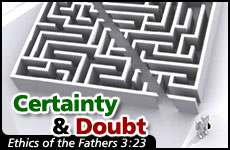 Identifying as a Jew
Identifying as a Jew


5 min read
Only through uncertainty can we ever find our way to wisdom.
Rabbi Elazar ben Chisma said: The laws of the bird-pair offerings and the beginning of menstrual periods – these are essential laws. Astronomy and gematria [the numeric values of the Hebrew letters] are the seasonings to wisdom.
Ethics of the Fathers, 3:23
Which are the most essential laws of Jewish observance? Possibly the Sabbath or the laws of kashrut; maybe prayer or Torah study; or perhaps the civil laws that govern social interaction. But how many of us would consider the two areas of law identified by Rabbi Elazar ben Chisma above as "essential."
Granted, it's easy for us to overlook the profound spiritual significance of Temple offerings, which have absent from Jewish practice for nearly 2000 years. And even if we appreciated their importance, we would certainly have attributed greater significance to the daily offerings brought on behalf of the nation, to the Yom Kippur offering brought as an atonement for the people, or to the Pascal lamb central to the celebration of Jewish freedom. Indeed, the bird-pair offerings brought by a woman after giving birth may be unfamiliar to many of us altogether.
By the same token, many of us recognize the laws of family purity as integral to establishing and preserving the spiritual foundation of the Jewish home -- which is itself the spiritual foundation of the Jewish people. Even so, most of us will concede that the enormously complex and difficult details of these laws are best left to those rabbinic authorities well versed in such abstruse matters.
The lesson of Rabbi Elazar, however, suggests a common thread between these profoundly nuanced areas of law that weaves itself into every corner of Jewish practice and reveals itself to be truly essential. In short, both these topics of Torah law, perhaps more than any others, are areas subject to legal uncertainty and doubt.
CERTAINTY THROUGH DOUBT
The Maharal of Prague, without dwelling on the myriad technical questions that arise in the resolution of these two subjects, explains that increasingly complex issues demand increasingly refined abilities to reason, the think critically, to differentiate between similar and dissimilar cases and rulings, to assess evidence objectively and dispassionately, to seek truth tirelessly and sincerely. What makes these areas of Torah law so essential is not that their subjects are ly important, but that they require such intense study and discernment that the scholar who has mastered them has mastered the tools to resolve any question addressed to him.
However, much more is implied here than merely the tools of wisdom. The willingness to persevere in the resolution of doubt is an attitude. If unfailing certainty and precision are necessary in such disciplines as aeronautics, brain surgery, and nuclear energy, no less certainty and precision is demanded in determining the fine points of Jewish Law, which is the practical expression of the Divine Will. Sincere commitment to safeguarding the laws of the Torah is synonymous with perseverance in resolving every uncertainty.
In contrast, such disciplines as astronomy and gematria, although not intrinsically essential, are mechanically invaluable. Without the ability to calculate, to manipulate facts and figures, to interpolate and extrapolate mathematically, the more abstract disciplines of analysis and evaluation are impossible. This is why Rabbi Elazar describes them as the seasonings to wisdom.
An unseasoned meal may be nutritious, but a meal so bland as to be unpalatable will be pushed aside uneaten. Consequently, Rabbi Elazar warns us that the mechanics of reason -- the process of mathematical calculation -- is indispensable as the means of acquiring knowledge. On the other hand, the development of critical thinking and analytic discernment is necessary for the acquisition of wisdom. Without wisdom, knowledge takes us nowhere. Without knowledge, wisdom is unattainable.
Unlike any other creature in the universe, human beings possess an innate desire to understand.
The same distinction applies to Torah wisdom and secular knowledge. The latter provides the fundamental tools for understanding the physical world, while the former takes that knowledge and applies it toward achieving spiritual fulfillment in our relationship with our Creator.
THE SEARCH FOR WISDOM
Even for those of us who are not scholars, Rabbi Elazar's lesson contains relevance. Unlike any other creature in the universe, human beings possess an innate desire to understand. We cannot abide doubt, and the thoughtful person remains unsatisfied by glib answers and superficial explanations.
Rabbi Elazar instructs us in the process of doubt resolution. To find, to recognize, and to understand real answers, we must be equipped with sufficient intellectual skills to be able to search for truth and understand it when we find it. However, it is an entirely different faculty that enables us to first differentiate between authentic truth and the many deceptive falsehoods that masquerade as truth, and then to accept truth as authentic when it challenges our preconceptions.
In an era of moral relativism, to seek truth is fashionable; to claim to have found truth is pretentious. Like anyone embarking on an arduous journey, the sincere truth-seeker must have the tools that will allow him to succeed. But he must also have the willingness to stop searching when he has found what he is searching for.
